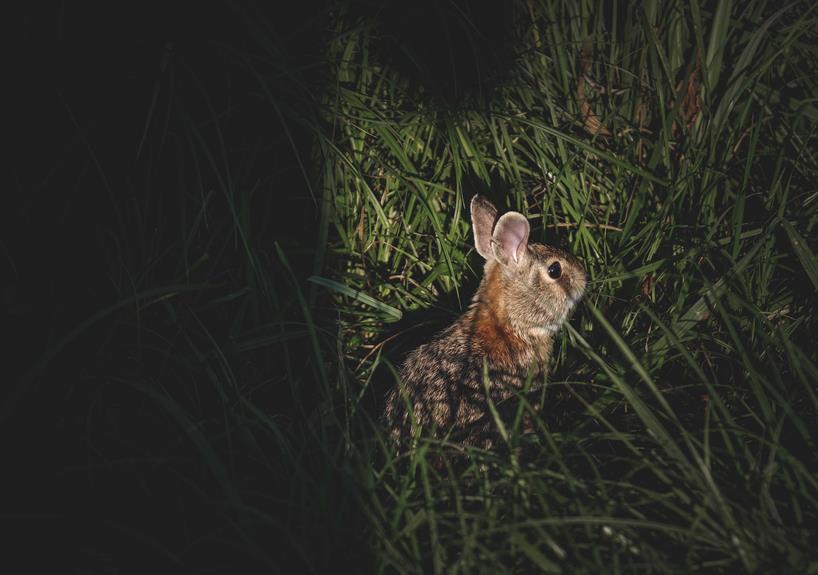Did you know that rabbits have exceptional vision in low light conditions? Contrary to popular belief, rabbits can see fairly well in the dark, thanks to their unique adaptations.
Their eyes have special structures that allow them to gather and utilize even the tiniest amount of available light. However, there are certain limitations to their vision in complete darkness.
Understanding how rabbits navigate in the dark can provide valuable insights into their behavior and survival strategies.
In This Article
- 1 Key Takeaways
- 2 The Visual System of Rabbits
- 3 Adaptations for Low Light Conditions
- 4 Limitations of Rabbit Vision in the Dark
- 5 Factors Affecting Rabbit Visibility at Night
- 6 Comparing Rabbit Vision With Other Nocturnal Animals
- 7 Frequently Asked Questions
- 7.1 Are Rabbits Completely Blind in the Dark?
- 7.2 Can Rabbits See Better in the Dark Than Humans?
- 7.3 Do Rabbits Have a Harder Time Seeing in the Dark Compared to Other Nocturnal Animals?
- 7.4 How Do Rabbits Navigate at Night Without Bumping Into Objects?
- 7.5 Do Rabbits Rely Solely on Their Vision in the Dark or Do They Use Other Senses as Well?
- 8 Conclusion
Key Takeaways
- Rabbits have a wide field of vision due to the positioning of their eyes on the sides of their head.
- Rabbits have a specialized structure in their eyes called the tapetum lucidum, which acts as a mirror and reflects light back through the retina.
- Rabbits have a high density of rod cells in their retinas, which allows them to gather more light and enhance their visual acuity in dimly lit surroundings.
- While rabbits have excellent night vision compared to humans, their visual acuity is still lower in low light conditions and they rely on other senses, such as hearing and smell, to compensate for their limited vision in the dark.
The Visual System of Rabbits
You’ll be surprised to learn that rabbits have a highly developed visual system. Their eyes are positioned on the sides of their head, providing them with a wide field of vision. The shape of their eyes is similar to that of most mammals, with a cornea, lens, and retina.
However, what sets rabbit eyes apart is their ability to adapt to low-light conditions. Rabbits have a high concentration of rod cells in their retinas, which are responsible for detecting light and motion. This adaptation allows rabbits to see in dim light and navigate their surroundings, even during the night.
Additionally, rabbits have a tapetum lucidum, a reflective layer behind the retina that enhances their vision in low-light environments. These adaptations make rabbits well-suited for their nocturnal behavior and help them detect potential dangers in the dark.
Adaptations for Low Light Conditions
In low light conditions, your vision improves due to adaptations in your eyes. These adaptations provide evolutionary advantages for animals that engage in nocturnal behavior, such as rabbits.
One such adaptation is the presence of a specialized structure in their eyes called the tapetum lucidum. The tapetum lucidum acts as a mirror, reflecting light back through the retina, enhancing the sensitivity of their vision in low-light environments.
Additionally, rabbits have a high density of rod cells in their retinas, which are responsible for detecting light. This abundance of rod cells allows them to gather more light and enhance their visual acuity in dimly lit surroundings.
These adaptations enable rabbits to navigate and forage efficiently at night, giving them a competitive edge over diurnal animals in the darkness.
Limitations of Rabbit Vision in the Dark
Your vision may be limited in low light conditions due to the adaptations in your eyes. Rabbits, like humans, have certain limitations when it comes to seeing in the dark.
While they have excellent night vision compared to humans, their visual acuity is still lower in low light conditions. This means that their ability to see fine details and distinguish objects may be compromised.
Additionally, rabbits have a limited ability to dilate their pupils like some other nocturnal animals can. Pupil dilation helps in allowing more light into the eyes, improving vision in low light conditions.
However, rabbits have adapted to rely more on their other senses, such as their acute hearing and sense of smell, to compensate for their limited vision in the dark.
Factors Affecting Rabbit Visibility at Night
When it’s nighttime, factors like ambient light and surrounding vegetation can affect how well you can spot a rabbit.
Several factors can impact rabbit visibility at night. One of the main factors is the level of ambient light available. Rabbits have adapted to low light conditions by having larger eyes compared to their head size. This allows them to gather as much available light as possible. Additionally, rabbits have a reflective layer behind their retina called the tapetum lucidum. This layer reflects light back through the retina, increasing their sensitivity to low light conditions.
Another factor that affects rabbit visibility is the surrounding vegetation. Dense vegetation can provide camouflage, making it difficult to spot a rabbit even in low light conditions.
Understanding these factors can help you better serve rabbits in their natural habitats.
Comparing Rabbit Vision With Other Nocturnal Animals
Comparing rabbit vision to other nocturnal animals, you’ll find that rabbits have larger eyes and a reflective layer behind their retina, allowing them to gather more light and increasing their sensitivity in low light conditions. This gives rabbits a distinct advantage when navigating in the dark.
Here are three key differences between rabbit vision and that of diurnal animals:
- Eye size: Rabbits have larger eyes compared to diurnal animals, which allows them to capture more light in dimly lit environments.
- Reflective layer: The reflective layer behind the rabbit’s retina, called the tapetum lucidum, enhances their ability to see in the dark. It reflects light back through the retina, giving the photoreceptor cells a second chance to detect it.
- Light sensitivity: Rabbits have a higher sensitivity to low light conditions due to their larger eyes and the presence of the tapetum lucidum. This enables them to perceive objects that might be difficult for diurnal animals to see.
Understanding these differences sheds light on the remarkable adaptations that allow rabbits to thrive in their nocturnal habitats.
Frequently Asked Questions
Are Rabbits Completely Blind in the Dark?
Rabbits have excellent night vision, but they are not completely blind in the dark. Their large eyes and tapetum lucidum help them gather and reflect light, enhancing their ability to see in low-light conditions.
Can Rabbits See Better in the Dark Than Humans?
Rabbit night vision is superior to human night vision. In the dark, rabbits can see better due to their larger eyes, specialized retina, and ability to detect low levels of light.
Do Rabbits Have a Harder Time Seeing in the Dark Compared to Other Nocturnal Animals?
Rabbits’ night vision capabilities are not as strong as those of other nocturnal animals. They have a harder time seeing in the dark, which may affect their ability to navigate and find food.
Rabbits use their whiskers to navigate in the dark by brushing them against objects and feeling changes in the air currents. Their exceptional hearing also helps them detect and avoid obstacles, making them skilled night navigators.
Do Rabbits Rely Solely on Their Vision in the Dark or Do They Use Other Senses as Well?
In the dark, rabbits rely not only on their vision but also on their acute hearing and keen sense of smell. These sensory abilities work together to help them navigate and explore their surroundings with precision.
Conclusion
In conclusion, rabbits have certain adaptations that allow them to see reasonably well in low light conditions, but they aren’t truly nocturnal animals. While their eyes have specialized features such as a tapetum lucidum that enhance their night vision, rabbits still have limitations when it comes to seeing in complete darkness.
Factors such as moonlight, ambient light, and environmental conditions can affect their visibility at night. As the saying goes, ‘In the land of the blind, the one-eyed man is king,’ highlighting the relative advantages of rabbit vision in the dark compared to other nocturnal creatures.





